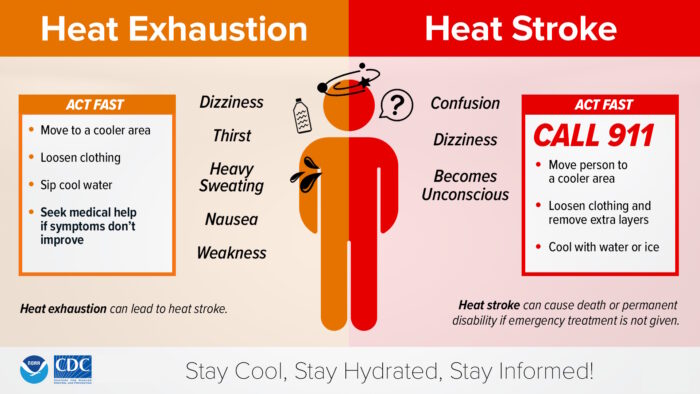As summer temperatures continue to soar, the state Dept. of Health and Human Services is urging caution when spending time outdoors or in areas that are not air conditioned.
Halfway through the summer season, from May 1 to July 12, NCDHHS has documented more than 3,300 emergency department visits for heat-related illness, the highest number in the last five years. In comparison, there was an average of 1,675 heat-related illness emergency department visits in the same time period in 2020 to 2024.
“We are seeing more people coming to emergency departments across the state with heat-related illnesses this summer,” said Dr. Zack Moore, NCDHHS State Epidemiologist. “Heat-related illnesses can affect anyone, regardless of age or physical condition, but some groups are at higher risk, including outdoor workers, infants and children, older adults, pregnant people, athletes, low-income individuals and people with underlying health conditions.”
Recognizing the symptoms of heat illness is key to preventing serious complications, including death. Some signs and symptoms include heavy sweating, paleness, muscle cramps, racing or weak pulse, dizziness, headache, fainting, and nausea or vomiting.
To help prevent heat-related illness, the NCDHHS Heat Health Alert System sends out heat alerts when the forecast is projected to reach unhealthy levels. From May 1 to July 18 of this year, more than 900 county-level alerts were distributed in English and Spanish across the state. Visit the NCDHHS Climate and Health webpage to sign up for heat alerts.
NCDHHS also recommends the following tips to stay safe in hot weather:
- Stay hydrated: Drink plenty of water throughout the day and don’t wait until you’re thirsty to drink. Avoid or reduce alcohol and caffeine intake.
- Limit time outside: Avoid outdoor activity during the hottest parts of the day if possible. Wear light, loose clothing and take frequent breaks in shade or air conditioning.
- If you don’t have air conditioning and it’s hotter than 95 degrees, go to a public building where it’s cooler.
- Stay informed: Sign up for NCDHHS heat alerts and stay updated on local weather forecasts so you can safely plan outdoor activities.
The NCDHHS Division of Public Health continues to provide reports and outreach to minimize extreme heat impacts. In addition to the Heat-Related Illness Surveillance System and Heat Health Alert System the NCDHHS Climate and Health Team provides other services to prevent heat-related illness, including:
- Providing 1,300 high-velocity cooling fans to farmworkers across the state and to partners in the sandhills region;
- Creating training for doctors and care teams to treat and prevent heat-related illnesses in farmworkers in collaboration with the NCDHHS Office of Rural Health;
- Distributing educational materials to populations at risk of extreme heat exposure, including water bottles, cooling towels and hats that include guidance on heat prevention strategies; and
- Supporting the NC Department of Environmental Quality in planning and leading the Extreme Heat Cohort Program for local governments and partners to develop a heat action plan.







